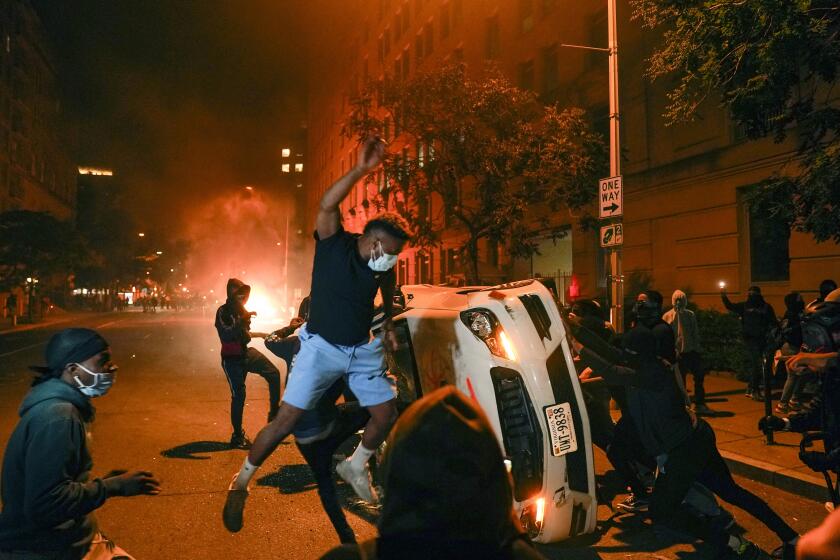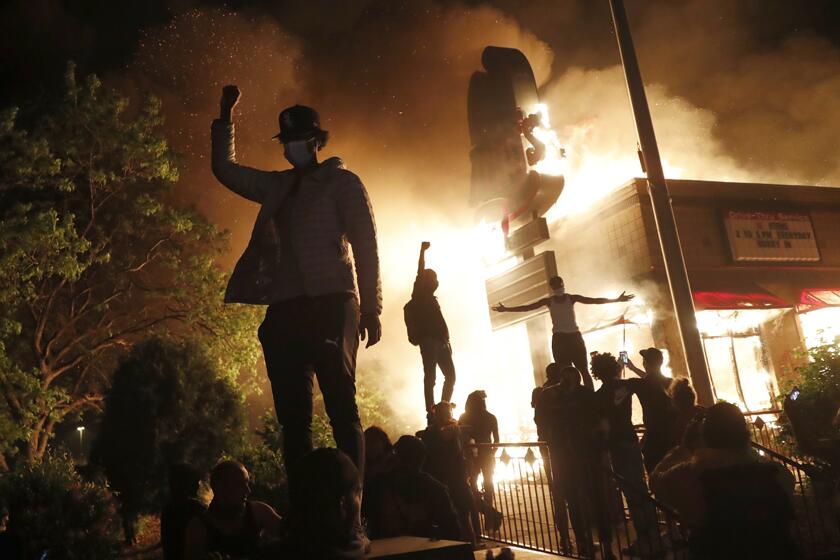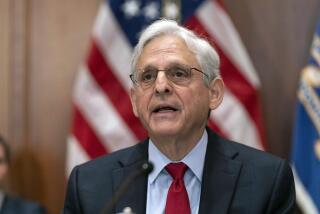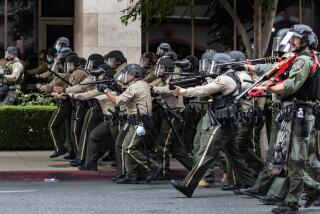Police chiefs’ condemnation of George Floyd killing highlights impact of criminal justice reform movements
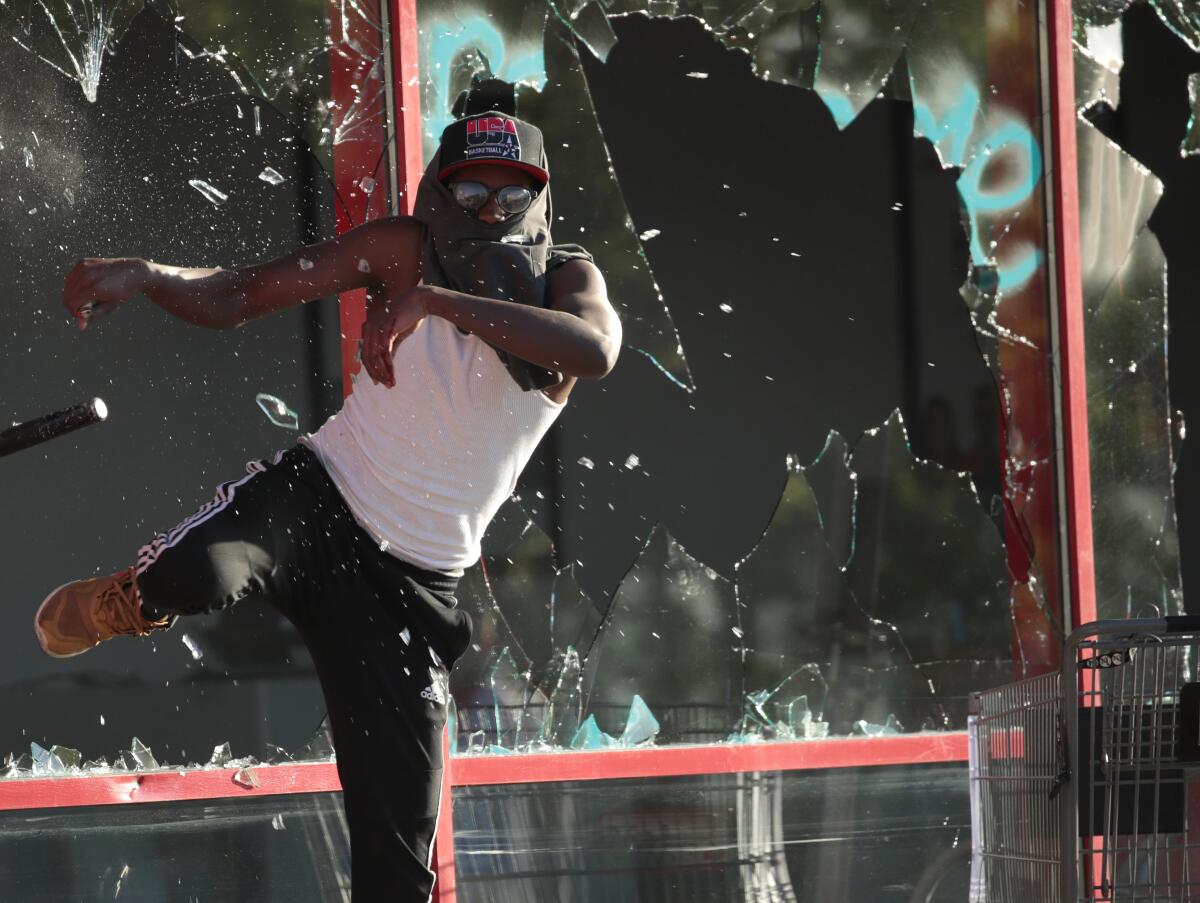
- Share via
MINNEAPOLIS — As footage of George Floyd begging for help while he died under the knee of a Minneapolis police officer continued to stoke outrage across the country, the chorus of voices condemning the killing was joined by unfamiliar allies.
Leaders of some of the largest police departments in the U.S. have spoken out this week against the officer at the center of the video, criticizing not only his tactics but also fellow officers who might seek to justify Floyd’s death. It was a rare moment when police leaders were unequivocal in their public disdain for the conduct of one of their own.
New York City Police Commissioner Dermot Shea said Thursday that the officer’s actions were “deeply disturbing.” Los Angeles Police Chief Michel Moore said the footage tarnished others who wear a badge and tore “at the very fabric of race relations in this country.”
Over the last two days, L.A. County Sheriff Alex Villanueva, Houston Police Chief Art Acevedo and the heads of police agencies in half a dozen other cities across the U.S. have bluntly criticized the actions of Minneapolis Police Officer Derek Chauvin.
“There is no need to see more video. There [is] no need to wait to see how ‘it plays out.’ There is no need to put a knee on someone’s neck for NINE minutes,” Chattanooga, Tenn., Police Chief David Roddy tweeted Wednesday. “There IS a need to DO something. If you wear a badge and you don’t have an issue with this ... turn it in.”
In years past, police brass might have asked for the public’s patience during similar controversies or offered a refrain about the footage not telling the entire story. But law enforcement experts and criminal justice activists believe the visceral depiction of Floyd’s death -- a black man beneath the knee of a white officer -- and years of demonstrations following officer-involved killings made it palatable to call out blatant misconduct.
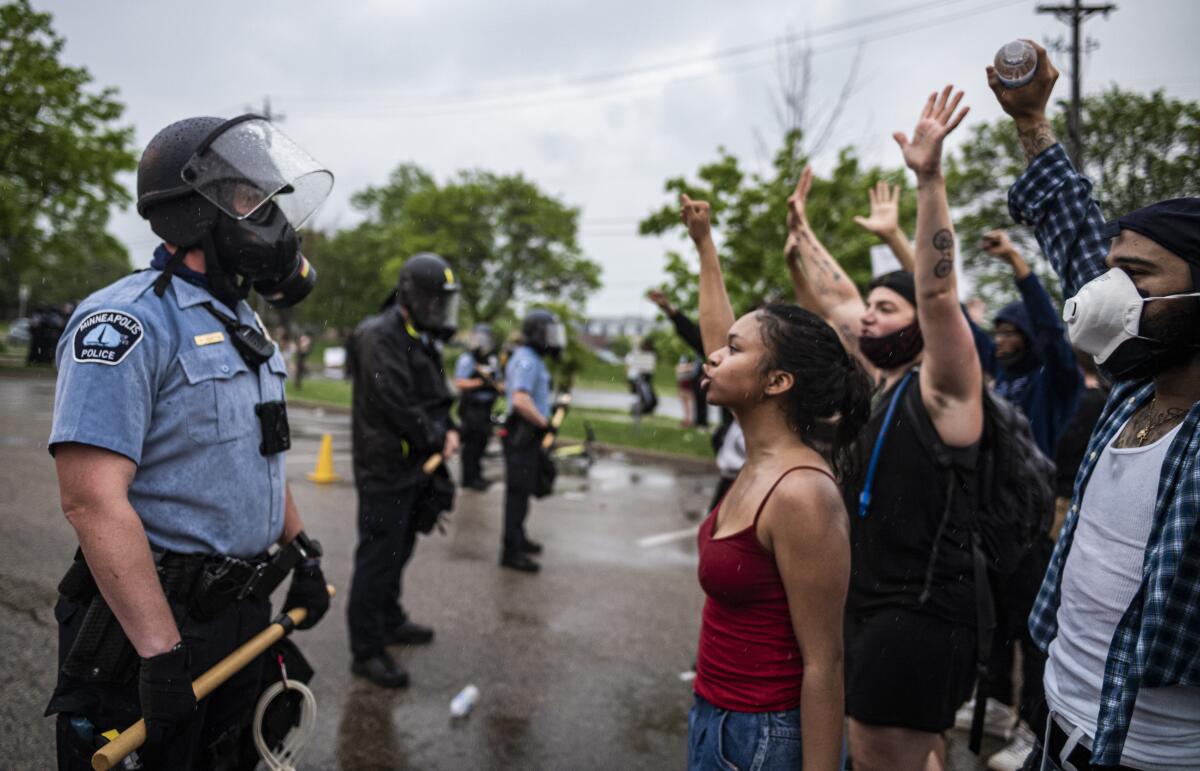
“I think Black Lives Matter has to take credit for the consistency in which we have reminded people that black death is unacceptable, even by the police. I think there was a community response to Eric Garner, but there wasn’t a political response,” said Patrisse Cullors, co-founder of Black Lives Matter. “Now that there’s been seven years of consistent fight back and resistance and challenge, I think people are changing. I think people’s minds are changing, hearts are changing.”
Floyd’s deadly encounter with police began Monday night after he was accused of trying to use a counterfeit $20 bill at a grocery store.
Cellphone video of Floyd’s arrest outside the business shows Chauvin driving his knee into the 46-year-old’s neck as Floyd pleads that he can’t breathe. After several minutes, Floyd appears to lose consciousness and a bystander can be heard yelling that Floyd’s nose is bleeding. Even as paramedics arrive to check Floyd’s pulse, Chauvin’s knee remains positioned on the man’s neck.
In an interview Thursday, Moore said the gruesome nature of the video was part of the reason he felt compelled to speak out.
“The technique, the visual of an individual on the ground, apparently not offering resistance, expressing in an ongoing persistent fashion that he can’t breathe, that he’s having difficulties breathing,” Moore said. “He’s in despair. He’s in duress.”
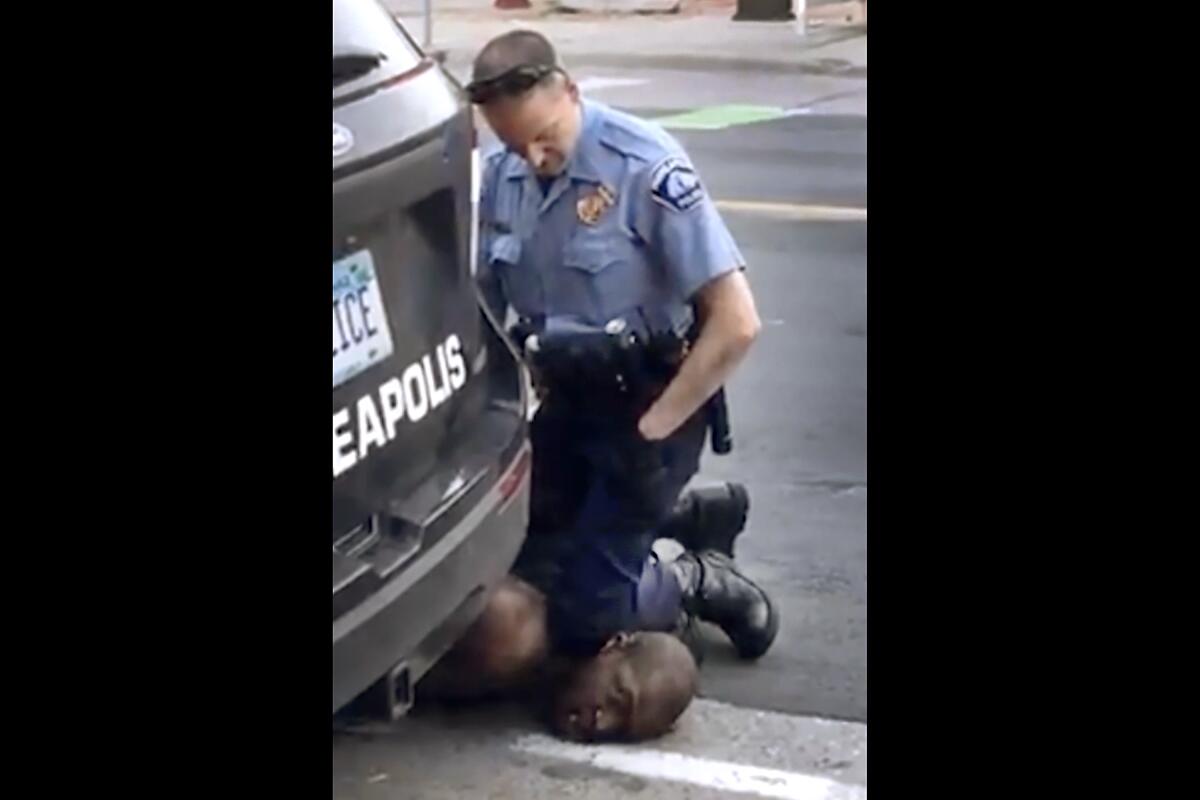
Although it’s rare for sitting police chiefs to so openly criticize the actions of an officer involved in a controversial on-duty killing, it’s not unheard of. In 2016, then-LAPD Chief Charlie Beck called on Los Angeles County Dist. Atty. Jackie Lacey to prosecute one of his officers for the fatal shooting of a homeless man in Venice Beach. Lacey ultimately declined to do so. Beck declined to comment on Floyd’s death.
Some activists noted that even the local police union had not offered the type of spirited defense of the officers that has become commonplace during other national controversies. It signified, at least to some, a defining event in the nation’s often disturbing racial climate between the police and the public.
After Tamir Rice was shot and killed in Cleveland in 2014, the head of the city’s police union described the 12-year-old as “menacing.” In the wake of Floyd’s death, Minneapolis police union President Bob Kroll -- who called Black Lives Matter a “terrorist organization” after a prior shooting in the city, according to the Minneapolis Star Tribune -- only asked for the public to wait for the completion of an “in-depth investigation.”
Still, some observers noted, the litany of police leaders criticizing Chauvin’s actions stopped short of calling for the officer to be prosecuted.
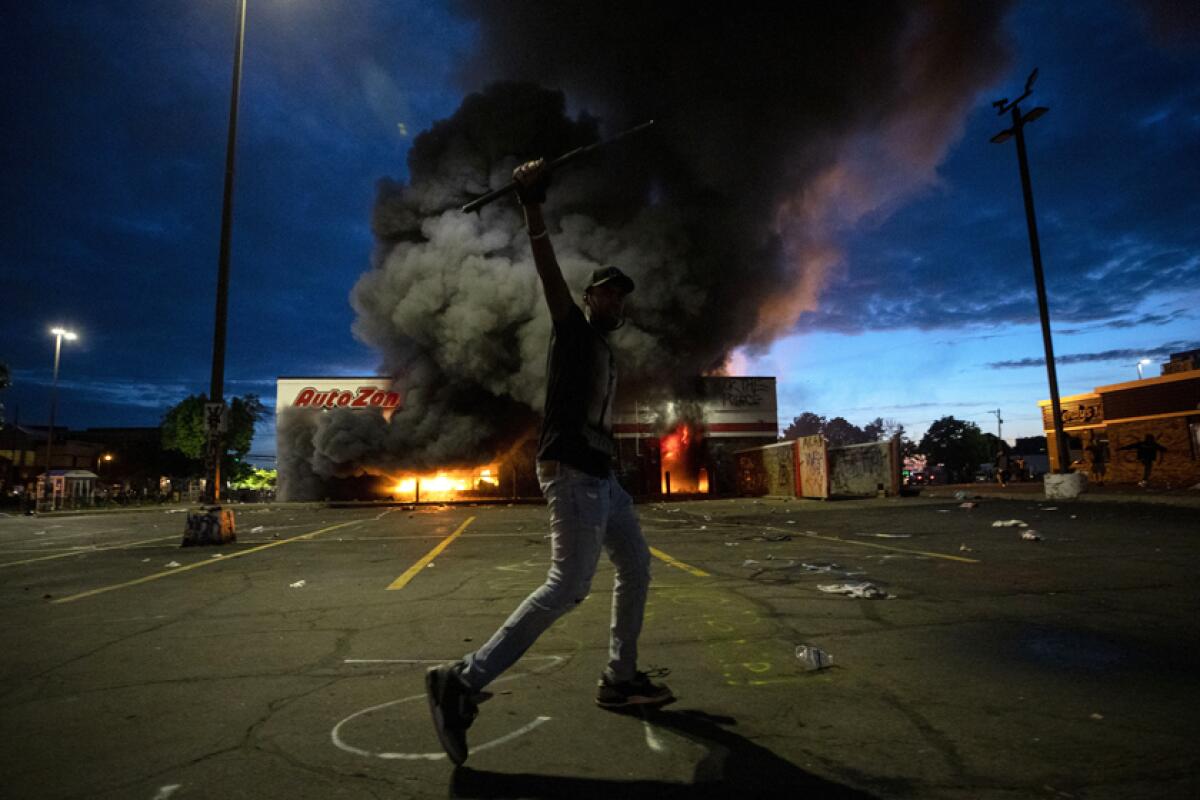
“There’s always that line. The line that keeps everything the same way,” said Patricia Bynes, a former Democratic committeewoman in Ferguson, Mo., who was involved in demonstrations after the shooting death of Michael Brown in 2014.
But Bynes also believes sustained demonstrations like those in Ferguson helped create an atmosphere drastically different from the one she faced in Missouri years ago.
“You’ve got these politically correct things, where it’s now OK to say this,” Bynes said. “Because back in Ferguson, you didn’t even say this much about what’s going on.”
In Minneapolis, echoes of Ferguson could be felt through a chaotic night of protests that ended with looting and buildings burning. Minnesota Gov. Tim Walz called in the National Guard on Thursday as he braced for another night of potential chaos.
Demonstrators break into a Minneapolis police precinct station after the department abandoned it, setting it ablaze, as protests spread nationwide.
Demonstrators in Minneapolis have made clear that they will not accept anything short of a prosecution.
“There is ample probable cause to arrest them. Had community members engaged in the violence these officers engaged in, they would already have been arrested,” said Michelle Gross, president of Communities United Against Police Brutality. “The fact that these dangerous men are free to roam the streets is indicative of the special treatment they are being given as cops.”
Twyana Balla, a 38-year-old black woman who owned one of the businesses damaged during Wednesday’s demonstrations, said condemnations from the city’s mayor and other national police leaders rang empty as long as Chauvin remained free, she said.
“We’re wondering why are you sitting home? You caused all of this,” she said.
Asked why he had upbraided the officer’s actions but stopped short of calling for a prosecution, Moore said he didn’t feel qualified to speak for a district attorney.
Atlanta-based CNN said that the crew, which included CNN reporter Omar Jimenez, was released later Friday morning.
“I don’t know Minnesota law, what constitutes criminal homicide, what constitutes manslaughter.… That’s not my area of expertise or understanding,” he said. “What I speak from is 38, going on 39, years of law enforcement experience.... I believe that I can see and recognize to me what appears to be a lack of humanity, a lack of compassion.”
The police leaders speaking out from thousands of miles away and demonstrators marching through Minneapolis at least seemed to agree on one thing: A life was taken for no reason.
“Do not defend the undefendable, attempt to justify the unjustifiable or excuse the inexcusable,” Miami Police Chief Jorge Colina tweeted Thursday. “George Floyd should be alive today.”
Queally reported from Los Angeles and Hennessy-Fiske from Minneapolis. The Associated Press contributed to this report.
More to Read
Sign up for Essential California
The most important California stories and recommendations in your inbox every morning.
You may occasionally receive promotional content from the Los Angeles Times.
